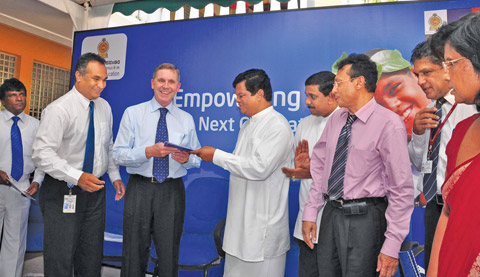Intel/Ministry ensure local communities benefit from IT
by Surekha Galagoda
|

John E Davies and Minister of Higher Education Bandula
Gunawardana exchanging the MoU
|
Sri Lanka has laid the foundation to be an ICT driven nation and now
it has to be action, said Vice President of Intelís Sales and Marketing
Group and General Manager of Intelís World Ahead Program, John E.
Davies.
Low cost of broadband connections, establishment of a knowledge
commission and elimination of taxes on IT related equipment are some of
the forward looking moves taken by the Government to promote the use of
information technology.
Davies said that the cost of broadband connections in Sri Lanka is
low compared to other countries.
This is an advantage as it makes it more affordable, be it in homes,
businesses or education. There is a need to get more computers to
people.
He said that the knowledge commission consists of groups representing
the fields of IT banks and government. In other countries you donít get
this much of coverage which is a positive sign.
Davies said that Government from the last budget eliminated the taxes
on PCS and on internet connections.
|
Laptops for undergrads
*The Ministry of Higher
Education is planning to give laptops to students who enter
universities on loan.
*Students are expected to
pay back once they become employed.
* Expressions of Interest
were sent out and distribution of laptops will commence, an
official of the Ministry said. |
These are forward looking moves. He said that the world over there is
not enough highly qualified science and engineering graduates but there
is a high demand for them.
During his visit to Sri Lanka, Intel and Sri Lankaís Ministry of
Education signed two Memorandums of Understanding that are intended to
strengthen science and maths education in Sri Lanka, aiming to empower
the next generation of Sri Lankan students.
As part of the first MoU, Intel hopes to see its school e-learning
program, which is currently available in English, be made available in a
Sinhalese-language version.
In addition, Intel and the Ministry of Education expressed a shared
desire in the second MoU to see the Sri Lanka Science and Engineering
Fair (SLSEF) take place again this year. The two MoUs aim to give Sri
Lankan students the opportunity to develop and showcase their maths and
science skills, and to strengthen the use of technology in the
classroom.
Intelís school program, initiated in 2007, offers teachers and
students e-learning tools and resources that are designed to be more
engaging and improve the learning process. Making these resources
available in Sinhalese, in addition to the existing English version,
will make them accessible to more students in Sri Lanka.
This is a good opportunity for students to enhance their education
through the use of technology and show results. Ensuring that local
communities benefit from technology is an important step towards
building a brighter future for Sri Lanka.
ďWe are working with local communities and educational institutions
through our Intel World Ahead Program to ensure that these opportunities
are realised,Ē Davies said.
The Sri Lanka Science and Engineering Fair (SLSEF) is held in
December each year. Competitors for this fair are selected from the
Science Research Project competition of the National Science Foundation
(NSF) of Sri Lanka and the annual Junior Inventor of the Year (JIY)
competition held by the Institution of Engineers Sri Lanka (IESL).
The ten best projects from these are brought together to compete at
SLSEF.
|

